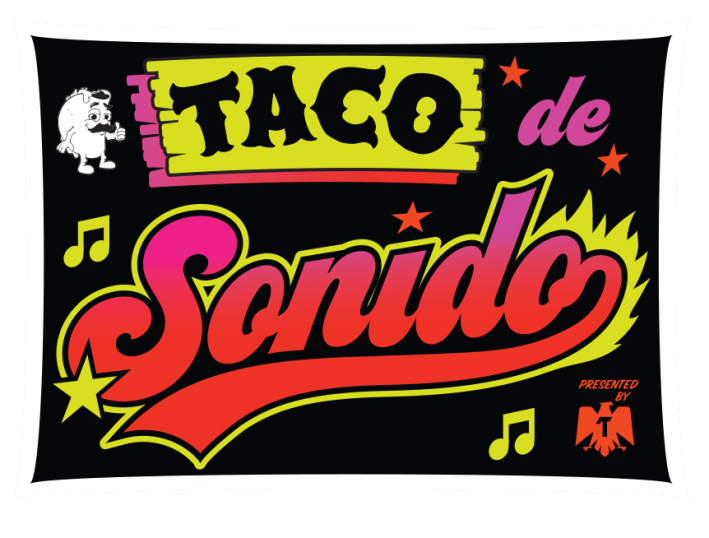
Welcome to Taco de Sonido, our new monthly music column presented by Tecate, the official beer of L.A. TACO. Each month we'll bring you the latest up-and-coming artists that are staking a claim to the new sound of Los Ángeles. Read, listen, share, and don't be afraid to share your comments or suggestions for new artists for us to check out. We've got our ears on the street but we want to hear from YOU.
[dropcap size=big]N[/dropcap]iña Dioz, the first openly-gay female MC who originally hails from the northern Mexican city of Monterrey, doesn’t consider herself a political rapper. This past May, the popular HBO series Insecure featured her song “Salsa” on the soundtrack and its millions of viewers.
“They could have chosen anything from that three minute and a half song, and they chose those 15 seconds. It was great to have a song in a global show that spoke in favor of immigrants and Latinos in the states.” The now TV-famous verse is:
“Niña tiene la salsa
Tumbando la casa
Como Kid Frost, this is for la Raza...
Como Y.G, fuck Donald trump
Desde MTY sonando en East Los”
It was a watershed moment for Dioz and her musical abilities, adding to her prestige as a rapper and highlighting her crossover appeal.

The song itself is an absolute banger to the highest degree. The beat’s opening notes possess a certain ability to wrap its fingers around the listener’s consciousness, creeping in at a slow pace, challenging anyone who falls victim to its mystique. Then Niña’s vocal enters the fray, announcing her arrival by merely declaring, “I’ve got the sauce.”
Diaz, who has been rapping since she was a teenager, became enamored with hip-hop music after hearing Control Machete, from her hometown of Monterrey, with such global smash hits as Compredes, Mendes? and Si, Senor. The group left an impression on her in terms of what was possible through the lens of rap music. “I saw what was happening in Monterrey, and I knew I wanted to do something special to reflect those influences...cumbia, with rock, hip-hop, and everything together.”
This “cultural mestizaje” that drew Dioz in was representative of a larger movement happening in Mexico at the time. Groups such as Plastilina Mosh and Toy Selectah, who she cites as creative heroes for their astute ability to blend and mix styles. “Norteño music to hip-hop to rock to electronic to Mexican vibes creating a new style,” said Dioz.
“I don’t want to sound like a rapper from the states. That already exists. We already have Nikki Minaj. We already have Cardi B. I have to sound like myself. I’m a rapper from Mexico, and I have to show you where I come from.”
After gaining her popularity in her native Monterrey, Dioz took the next step by taking her talents to Mexico City in 2008. To Dioz, the move represented a personal shift where she sought to grow and develop her creative abilities and reach a wider audience. Luckily, upon her move, it didn’t take long. A free download that she posted to MySpace called Cuando Cuando caught the ears of group radio programmers attracted to Dioz’s skill to encapsulate high energy, fast rhymes, and the unmistakable hardcore beat, all the hallmarks that she has become known for.
However, the hip-hop scene in Mexico looked significantly different, even just ten years ago. The scene was primarily underground and didn’t have the support of YouTube or streaming services. “You had to be a fan of rap and hip-hop to be able to reach us cause it wasn’t popular,” said Dioz. She equates the scene similar to that of cumbia and how both music genres were viewed as music for working-class people, thus preventing it from reaching a mainstream audience.
Dioz has the vision that her music and, by extension, Mexican hip-hop is worthy of universal appeal. She and her contemporaries hoped that the music could exist beyond any type of race, social class, or sexual orientation. “I saw the potential in rap music. I saw in the States how hip-hop was shaping and influencing pop and other genres. I was like, “hip-hop is going to be the #1 genre in the world.” I never had a question about that, but Mexico and Latin America took time to catch up.” Dioz notes that current Mexican and other Latin American hip-hop artists, who have gained popularity more recently, now sell out arenas, packing the seats with fans, waving their hands in the air, all dancing to the same beat.

Mexican identity plays a focal point in Nina Dioz’s music. After moving to Los Angeles, which she currently splits her time between CDMX, she developed an even deeper appreciation of her culture. A pivotal point in her inspiration as a musician was after meeting other immigrants who had crossed the border and hearing their stories of sacrifices and hardships they had made. “I met a lot of people who sacrificed everything just to be able to provide and help their families. It really inspired me and made me realize ‘Mexico... somos chingones’”
The series event also spurred further reflection of her upbringing and what she was taught in school, recalling how history lessons began with Spanish arriving in Mexico with no mention of Mayan and Aztec cultures’ contribution to society.
“The thing is when you are a kid, you’re shown that you should be inspired to be like the Americans, inspired to be like the Europeans.” Dioz makes her point to showcase her sense of pride in her music by exemplifying her own culture and greatness. “I don’t want to sound like a rapper from the states. That already exists. We already have Nikki Minaj. We already have Cardi B. I have to sound like myself. I’m a rapper from Mexico, and I have to show you where I come from.”
...She refers to [Mexican women] as “the queens without a crown” who don’t always get the recognition they deserve.
Despite comparisons, Dioz’s body of work speaks for itself. Its nods to the Chicano rap movement of the early 90s, specifically on her recent single, Mezcal, using a sample inspired by Norwalk’s Delinquent Habits hit song of Return of the Tres (the sample itself originates from Argentine tango El Choclo from the early 1900s). “Chicano rap has been really big in Mexico. It was one of those things that I listened to as a kid.”
Beyond the song’s place in the Chicano rap lexicon, Dioz wanted the single to serves as an anthem for Mexican women everywhere. Speaking of her admiration, she refers to them as “the queens without a crown” who don’t always get the recognition they deserve. “All the hard-working, courageous Mexican women that are killing it every day. I wanted to make a tribute for them.” The song’s title also refers to the spirit drink’s fiery-smokiness, serving as a metaphor to what Dioz describes as something that was both “powerful” and “feminine,” drawing inspiration from the goddess Aztec goddess of agave, Mayahuel.
Like many touring artists, Nina Dioz was all set to drop her next album in 2020. However, the pandemic forced her to make other plans. Instead, she artfully used this downtime to release a series of singles, Brillo, Último Perreo, Mezcal, and most recently, Primero, all showcasing the 33-year old artist in her prime with the utmost confidence and zero sign of slowing down.
Her natural tendencies to switch between styles effortlessly to spit fasted paced rhymes to softer sounding reggaeton tinged love songs. According to Dioz, the next album titled Amour, Locura, and Otros Vicios will feature this collection of songs. “I wanted to play it for people in person, hopefully, next year.” The album is poised to represent all the different flavors that Dioz herself has drawn inspiration from throughout her artist journey, a true maverick in her own right.
“I want my message delivered across different styles in different ways, speaking about my truth and also hope it inspires other people.”






